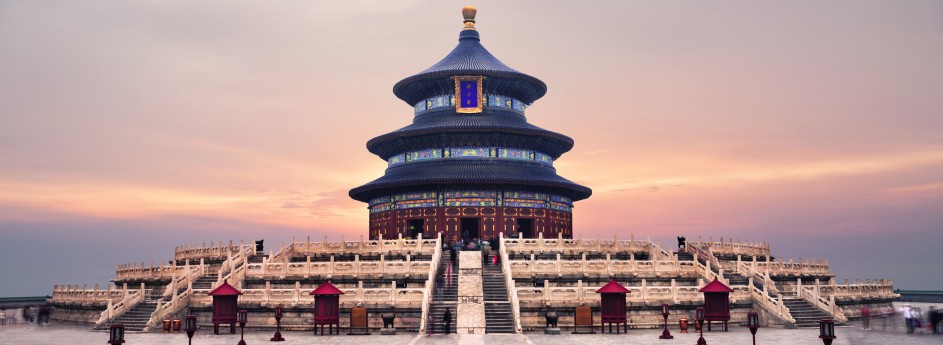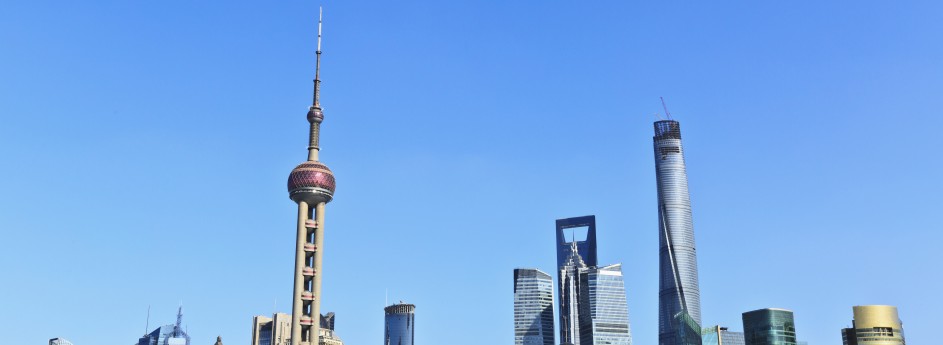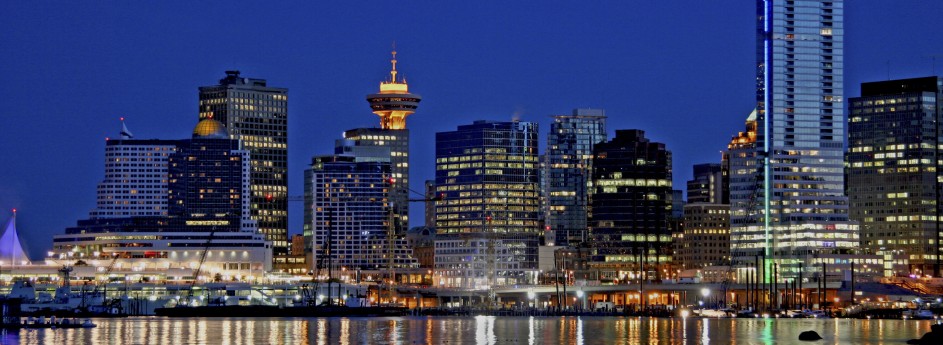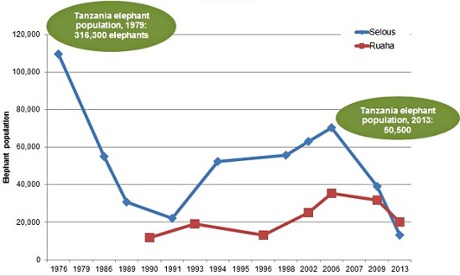China and the Illicit Ivory trade
Abiding by the 1989 international ban on the ivory trade, the Chinese government recently destroyed several tons of pristine tusks and works of ivory art to show its commitment to cracking down. But, as revelations last week of collusion between Chinese traffickers, corrupt Chinese officials, civilian and military, African politicians and businessmen, and poaching cartels, the Chinese government needs to come down even harder on trafficking and corruption.
London-based environmental NGO Environmental Investigation Agency (EIA) released a report stating that more ivory is being shipped out Tanzania than any other African country and Chinese criminal syndicates and officials are involved. About a year ago, EIA’s undercover investigators met a “tight-knit group” of smugglers at the Mwenge market in Dar es Salaam, known as a haven for ivory trading. The sellers worked with a group of Chinese “brothers” who had strong conduits to Guangdong province via the port of Zanzibar.
The EIA even discovered that a couple weeks prior to the state visit of President Xi Jinping to Tanzania in March 2013, Chinese ivory buyers bought out the entire market, saying openly that they were for some parties on President Xi’s entourage of businessmen and officials. After President Xi’s plane landed, the buyers had the audacity of bundling the illicit ivory in diplomatic pouches for shipment back to China on the presidential plane. Apparently, for a time, their buying spree led to the doubling of the black market price of ivory to US$700.
The EIA also accused the Chinese navy of complicity, citing the case of Chinese national Yu Bo who was detained by Tanzanian authorities in December 2013. He was attempting to deliver 81 tusks to two Chinese naval officers on an official visit to the Dar es Salaam port. After paying bribes of $20,000 at an initial checkpoint, he was caught at a second and subsequently sentenced to 20 years for which he has since appealed. One trader bragged he made US$50,000 on a deal with the naval personnel. A month earlier, three Chinese nationals were arrested after a raid on a house in a Dar es Salaam suburb uncovered 706 tusks.
The report similarly pointed to intimate involvement on the part of prominent Tanzanian politicians and businessmen, a secret list of which was submitted to President Jakaya Kikwete by intelligence sources. So far, however, none has been prosecuted due to strong ties to the ruling party. For instance, certain shipping companies implicated in major ivory seizures are run by Abdulrahman Kinana, Secretary General of the Chama Cha Mapinduzi ruling party, but he remains untouched.
Quoted by the Guardian newspaper, EIA executive director Mary Rice said, “This report shows clearly that without a zero tolerance approach, the future of Tanzania’s elephants and its tourism industry are extremely precarious…The ivory trade must be disrupted at all levels of criminality, the entire prosecution chain needs to be systematically restructured, corruption rooted out and all stakeholders including communities exploited by the criminal syndicates and those on the front lines of enforcement given unequivocal support…”
Tanzanian Foreign Minister Bernard Membe denied the report as “…fabricated…to tarnish the image of our country and our friend, the Chinese nation.” Although Chinese Foreign Ministry spokesman Hong Lei labeled the report “baseless”, he did add, “(the Chinese government) attaches importance to the protection of wild animals like elephants (and) we have been cooperating with other countries in this area.” Earlier this year, Mr Lu Youqing, Chinese Ambassador to Tanzania, lamented the role of Chinese nationals in the illicit trade, remarking, “our bad habits have followed us”. (quoted in the Guardian)
The number of African elephants has dwindled from an estimated 1.3 million in 1979 to about 419,000 today, said the EIA. Southern Tanzania’s Selous reserve, a hotbed of ivory poaching, has seen its elephant herd plummet from about 70,000 heads in 2006 to 13,000 last year. In the whole country, there were 142,000 elephants in 2005 but by next year, when President Kikwete is expected to leave office, the population will have dropped to around 55,000.
Whether the report is accurate and credible remains to be seen and in spite of international sanctions against trafficking, Chinese fondness for ivory carvings along with the handicraft industry supplying it will not diminish any time soon. Celebrities such as former NBA superstar Yao Ming have campaigned tirelessly against the poaching of elephants for ivory, rhinoceros for horns, and sharks for fins. But, in the protracted war against illegal ivory, Chinese authorities must be more vigilant to prevent perpetrators getting away with crimes from under their noses.
Canada Second Cleanest but China Still Very Corrupt: Trace Matrix Survey
The Western press routinely lambasts China for being corrupt and plagued with pervasive bribery risks for businesses, often suggesting that China’s political system is at fault and the transformation to electoral democracy as the panacea.
If you’re into rankings of ‘corruptness’, the Trace Matrix ranking of bribery risks in 197 countries across the globe (developed in collaboration with the Rand Corporation) that came out yesterday has Canada smelling pretty rosy, placing very high up in second with a score of 22, just behind world beater Ireland (score of 20). The lower the score, the cleaner the economy.
A cursory look at the ranking reveals a number of probable variables determining ‘corruptness’ versus ‘cleanness’ (this author’s assessment): 1) it seems to be correlated to a large extent with the level of economic development of countries; the more developed, the less corrupt; 2) corruptness tends to be more prevalent in countries with older civilizations that did not undergo democratic/capitalistic transformations on their own or were colonized such as China, India, Egypt to just name a few; and 3) with the exception of the Japan, Germany, and the US, the size of the economy and population matters with smaller, less complex but nonetheless sophisticated and therefore easier to manage countries tending to be ‘cleaner’. In this respect, Nordic countries seem to fair very well.
In terms of the Sinosphere, China placed very poorly on the index at 137th spot (score of 66) but Hong Kong SAR tied for 3rd with New Zealand and Sweden with a score of 23 and ethnic Chinese dominated Singapore tied for 7th with Japan (26). While Macao scored as bad as the mainland (perhaps due to the gaming industry and the legacy of underworld control), Taiwan was not surveyed. As for emerging market BRICs, China landed behind Russia (134th, score of 65) and ahead of Brazil (145th, score of 69) but way ahead of India (185th with a score of 80).
India is the West’s poster child for mass democracy and is often juxtaposed to China for its boisterous and chaotic politics as opposed to one-party authoritarianism. Yet, in various ratings of economic development, indicators of well-being, and corruption, India consistently falls way behind China. So, it seems that differences in political system exert little impact on results. It comes down to being mainly a function of economic development and market sophistication, competency of government at various levels, levels of transparency, and the government’s commitment to fighting corruption. The massive and successful anti-corruption campaign undertaken by President Xi Jinping’s forces is a case in point which is hardly possible in a polity such as India’s.
The ranking can be found at: http://www.traceinternational.org/trace-matrix/
Here’s a related G & M article: http://www.theglobeandmail.com/report-on-business/international-business/canadian-businesses-among-least-corrupt-survey/article21532628/?cmpid=rss1
In Beijing, Obama Calls ETIM “Terrorists”
In Beijing for the APEC Summit, President Obama toned down somewhat his Administration’s double-talk on East Turkistan Islamic Movement (ETIM) terrorism in Xinjiang but still couldn’t help himself from lecturing his hosts. Nonetheless, it’s a step in the right direction that he did come out explicitly and clearly on ETIM whose membership is predominately from the Uighur ethnic group. Over the past year, Uighur Jihadi extremists have killed a couple hundred police and the general public through knife and explosive attacks across Xinjiang and in key cities around China.
Of course, Obama is only doing so because he needs Chinese help in the fight against Jihadis, especially the ultra-violent and sadistic ISIL.
US President Barack Obama named a shady group linked to attacks in mainly Muslim Xinjiang as he called for cooperation with Beijing on anti-terror efforts in a Xinhua News Agency interview.
Beijing regularly blames an organization it calls the East Turkestan Islamic Movement for a series of deadly attacks in the western province, home to the Uygur minority. Violent attacks and clashes in and related to Xinjiang over the past year have claimed over 200 lives
“Terrorist groups like ETIM should not be allowed to establish a safe haven in ungoverned areas along China’s periphery,” Obama said.
Greater cooperation would depend “on actions China takes at home.
“As nations, we cannot confuse violent extremism with peaceful dissent.
“A failure to treat people equally or respect rule of law or universal rights can sometimes push people into the ranks of terrorist groups.
“Upholding these rights and the rule of law can often be one of the most effective long-term weapons against terrorism,” he added.
But he said China and the US could cooperate “in stemming the flow of foreign terrorist fighters and cracking down on terrorist funding networks.”
– AGENCE FRANCE-PRESSE




